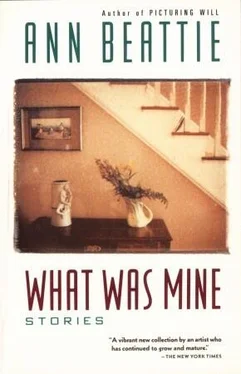Ann Beattie - What Was Mine
Здесь есть возможность читать онлайн «Ann Beattie - What Was Mine» весь текст электронной книги совершенно бесплатно (целиком полную версию без сокращений). В некоторых случаях можно слушать аудио, скачать через торрент в формате fb2 и присутствует краткое содержание. Год выпуска: 1992, Издательство: Vintage, Жанр: Современная проза, на английском языке. Описание произведения, (предисловие) а так же отзывы посетителей доступны на портале библиотеки ЛибКат.
- Название:What Was Mine
- Автор:
- Издательство:Vintage
- Жанр:
- Год:1992
- ISBN:нет данных
- Рейтинг книги:5 / 5. Голосов: 1
-
Избранное:Добавить в избранное
- Отзывы:
-
Ваша оценка:
- 100
- 1
- 2
- 3
- 4
- 5
What Was Mine: краткое содержание, описание и аннотация
Предлагаем к чтению аннотацию, описание, краткое содержание или предисловие (зависит от того, что написал сам автор книги «What Was Mine»). Если вы не нашли необходимую информацию о книге — напишите в комментариях, мы постараемся отыскать её.
What Was Mine — читать онлайн бесплатно полную книгу (весь текст) целиком
Ниже представлен текст книги, разбитый по страницам. Система сохранения места последней прочитанной страницы, позволяет с удобством читать онлайн бесплатно книгу «What Was Mine», без необходимости каждый раз заново искать на чём Вы остановились. Поставьте закладку, и сможете в любой момент перейти на страницу, на которой закончили чтение.
Интервал:
Закладка:
As she was looking for her car keys (she had promised Marsha she would drop off a letter to new members Marsha had given her earlier in the week), a word came to Mrs. Brikel’s mind: paradoxically . Typing Pia’s manuscript — or perhaps more exactly, reading the reviews — had provided Mrs. Brikel with quite an education. The reviewer for the Boston Globe had said that Pia’s book was about the Americanization of an Italian family. The reviewer wrote that paradoxically , only when she learned she had cancer and faced the prospect of death did Pia truly come to have a sense of her own individuality and strength. Mrs. Brikel had read the book twice — reading was quite a different thing from typing a manuscript — and on the second reading, with the help of the newspaper reviews, she began to see more clearly why people thought about the book the way they did. On first reading, she had thought that Pia was writing only about the difficulty of having made a specific transition. It seemed to her that a family would naturally have some trouble adapting to life in a new country. A family, like a small town, was a particular thing: you had to give up something in order to gain something. You had to give up some … what? Some individuality, for the common good. The only part of the book that still seemed puzzling was the part she had typed last, but that came first: the introduction.
In the introduction, Pia had made public a very surprising secret. Typing it, Mrs. Brikel had been uncomfortable. Imagine allowing the world to know that before going on vacation, she had taken the two special brassieres she had had made after her surgery and hidden them in the attic, in a suitcase inside another suitcase, so there was no chance her friends who were house-sitting would discover them and therefore discover her secret. That was not the most shocking part, however. The shocking part was Pia’s admission that she took it for granted her friends would snoop through her house. She spoke of them as if they were burglars looking for silver, or teenagers hunting for the liquor cabinet. Perhaps such things went on more than she knew. She had read letters in Ann Landers from people who claimed to have stumbled upon drug paraphernalia in the apartment of a friend, had overheard girls at school complaining that their mothers read their diaries. Looking through a keyhole had never held any fascination for Mrs. Brikel. Sticking her nose in other people’s business (as her own mother had called prying) had never seemed a way to maintain a friendship. Even when you did not ask, you usually heard more than you wanted to, in Mrs. Brikel’s experience.
She put on her hat and coat and picked up the keys from the little dish on the table in the hallway. It was not really a dish, but a saucer — a piece of Fiestaware in a dark shade of blue that Mr. Brunetti had given her as a little souvenir. She had gone to the Brunettis’ house to return a turkey baster Pia had once loaned her, as Mr. Brunetti had been packing to leave, and he had told her to please just keep the turkey baster. Then he had straightened up — he had been packing things in his study, and his face looked very bad, though perhaps it was just red because he had been bent over for so long — he had straightened up and said he supposed a turkey baster was not really the nicest thing he could think to offer her. Then he had asked what she might really like, and she had understood from the way he looked at her that if she said she would like the living-room sofa, it could have been hers. If she had said that she would like every picture on the wall, or even the china press, and all the china, that would have been hers also. So she had pointed at the closest thing: the piece of unpacked Fiestaware. She was sure that if she did not choose something small, he would insist she take something large and expensive. She tended to like things that were more delicate than Fiestaware, and in fact blue was not her favorite color, but she had been a little unnerved by his expression. So there it was, then — the blue saucer that served quite nicely as a place to keep her keys. As soon as she got a package of Kleenex from the kitchen drawer she would be ready to leave.
But instead of going into the kitchen, she sat down in the living room, luxuriating, for a moment, in the added warmth of her coat in what was finally, after all these years, a perfectly well insulated house. The sun was moving westward. In a couple of hours it would set and sink below the mountains.
She tapped her toes together, and looked at her shoes. They were a new sort of shoe Marsha had told her about that exercised the foot when you walked and resembled a ballet slipper: black cloth, with a small grosgrain bow on top. She liked them so much, and they were so comfortable, that sometimes she forgot where she lived — forgot that outside there was dirty snow, and deep mud where the snow had melted — and she would occasionally start out the door as if she could simply breeze off without a care in the world in her delicate new shoes.
In the spring she would wear them outdoors. She might even ride a bicycle to and from town then, if she built up more strength riding the stationary bike during the winter. What did it matter if you were a little eccentric, if you did not act exactly like everyone else? People were quick to forgive. They forgave you because they were eager to keep things polite and eager to get on with their own lives. On the day of Royce’s funeral, everyone had offered their condolences and admired her for what she had done. They spoke about the lightning that had struck the tree, the sudden storm that had blown up — they said everything they could think to say about what a gray, wild, windy day it had been, while saying nothing about the fact that if the sun had been shining, the flowers blooming, and all of nature glistening in the sunlight, Royce would still have wandered away, taken some crazy idea into his head, and drowned. The only difference might have been that if there had been no storm, someone might have been at the reservoir to hear his cries.
But who knew whether he had made a sound? The only sound might have been the slight stirring of water displaced by a body.
It was very hard to be alone in the world. Not alone as in no-one-in-the-house alone, but by yourself, even when you meant to be. Certain people would be drawn to you and would buzz around as if a quiet person, a woman in late middle age, no longer attractive, could provide them with nectar. Years before, her lover — Royce’s father — had hovered around that way. He was one of those people who would get as close as she allowed. It seemed not quite real now, all those rendezvous, and those late-night whispered phone conversations with him. Surprising and a bit sad, too, that Mr. Brunetti had wanted to confess first his peccadillos, then his absolute shame — his feeling that he could never forgive himself for ruining Pia’s life. Perhaps when sex was not involved it was easier for people to forgive. It had been years before she first had sex with Royce’s father — that had not been the nature of the attraction. And now she was old. Safe, in a way. Though there had been that odd moment the summer Royce died when she and Chap had coffee and the tension between them had been, undeniably, sexual. There was some urge as intimate as sex, though it had nothing to do with sex itself, which had made him confess that she had seen him when he first visited the Brunettis. She would never have remembered. That snowy day, and she had been in such a hurry. But he had wanted her to know that he had been there, a real person, someone she needed to factor into the landscape.
Sitting in the newly upholstered chair, enjoying the colors of the flowers in the fading light, she let her eyes sweep slowly across the floor. After Royce’s death, it had taken three men only one afternoon to make it perfectly level. The high polyurethane gloss made the floorboards glisten like water. It looked like a large, calm lake that she could imagine gliding swiftly over. Just looking at it, she could feel the buoyance of her heart.
Интервал:
Закладка:
Похожие книги на «What Was Mine»
Представляем Вашему вниманию похожие книги на «What Was Mine» списком для выбора. Мы отобрали схожую по названию и смыслу литературу в надежде предоставить читателям больше вариантов отыскать новые, интересные, ещё непрочитанные произведения.
Обсуждение, отзывы о книге «What Was Mine» и просто собственные мнения читателей. Оставьте ваши комментарии, напишите, что Вы думаете о произведении, его смысле или главных героях. Укажите что конкретно понравилось, а что нет, и почему Вы так считаете.












